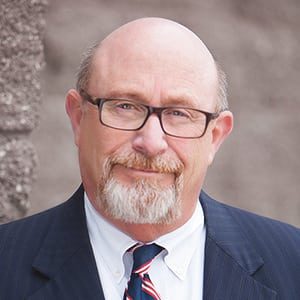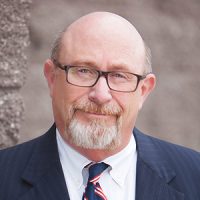
Home » TRIDEC approaches new year with long to-do list
TRIDEC approaches new year with long to-do list

December 13, 2017
Lobbying for federal funding, supporting entrepreneurs, adding new flights among its goals
After celebrating two major projects boosting the region’s employment in 2017 — the extensive Lamb Weston potato processing plant expansion and the opening of the AutoZone distribution center— the Tri-Cities Development Council is looking ahead to 2018.
On the economic development agency’s to-do list for the coming year are lobbying for funding for Pacific Northwest National Laboratory and Hanford cleanup; reclaiming the Columbia River shoreline for local use; exploring opportunities for new flights at the Tri-Cities Airport; launching a task force to support local entrepreneurs; and re-opening the Small Business Development Center.
 Carl Adrian,
Carl Adrian,Carl Adrian, president and CEO of TRIDEC, said economic development activity in Tri-Cities isn’t slowing after Lamb Weston and AutoZone together invested $250 million in new construction, resulting in the creation of 375 new jobs for the community.
“We’re responding on projects all the time,” Adrian said. “But none are presently in the final stages … we celebrate successes like AutoZone and Lamb Weston, but economic development is a process.”
“It’s like a marathon,” added Traci L. Jao, director of member services and communications at TRIDEC.
A project like AutoZone’s was on the radar in 2014 as “Project Sunrise” until plans for the new distribution center were solidified. AutoZone’s identity wasn’t publicly revealed to TRIDEC and others until 2016.
“When big companies make an investment in an area, it validates for others this is a good place to be,” Adrian said.
The two projects helped boost the number of available jobs in the region.
“We’re up 5,000 jobs from a year ago. We led the state in job growth in 2016, and it’s looking like we’ll lead again in percent job growth for 2017,” Adrian said.
“People continue to want to move here and live here in the midst of a great run that’s going to continue,” he said, adding 2018 won’t be without its challenges.
Adrian said despite increasingly positive trends, the high demand for available buildings and construction resources to develop land has made it difficult to get new companies in and up and running.
“In a way, it’s good there’s no vacancy, but then we don’t get to compete for those new projects because of it,” he said.
Another major impediment affecting future large-scale projects is the recent zeroing out of the Strategic Reserve Fund by the state Legislature.
“It’s what AutoZone and Lamb Weston used,” Adrian said. “Washington state offers a smaller toolbox of economic incentives, so those funds are important for Tri-Cities … it makes it more difficult to be competitive.”
He said it’s part of what makes economic development a team sport.
“We do have a very good team in Tri-Cities and committed partners,” he said.
One major project currently in the scoping stage is the development of a 100-plus-acre portion of the more than 1,300 acres of land transferred from the Department of Energy to the Port of Benton, city of Richland and TRIDEC in 2016.
Designated for the Mid-Columbia Energy Initiative, Adrian reported that in 2017, French renewable energy company Neoen expressed interest in buying part of the property for a solar farm.
Adrian said soil testing and other preliminary work is underway to determine which part of the vast tract will be most suitable for the project.
“We still need to find someone to buy the energy (produced),” Adrian said. “But the stars seem to be aligning.”
Adrian reported that going into 2018, TRIDEC will continue its advocacy efforts on several fronts.
“We have a long history of lobbying for funding for PNNL and the Hanford cleanup. We’re really the only group locally — outside of contractors and other communities — to get funding for programs for cleanup to progress.”
Adrian said TRIDEC remains firmly opposed to the deconstruction of the four Snake River dams currently under consideration and will continue to advocate for their preservation.
He also said TRIDEC will continue to be an active part of the effort to reclaim the Tri-Cities’ river shoreline from the Corps of Engineers, which currently manage it.
Adrian said city leaders will be holding a meeting to determine what the next step is in the process and to discuss what Congress will need in terms of numbers and site assessment information to return these lands to the jurisdiction of local governments.
Adrian also reported there will be another meeting held after the first of the year with major airline carriers to discuss how the Tri-Cities Airport can continue to improve, as well as opportunities for new flights — namely, direct service to Los Angeles and Phoenix, which the Tri-Cities Airport currently doesn’t offer.
Local News Year in Review
KEYWORDS december 2017




